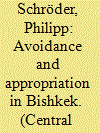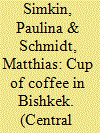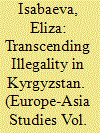|
|
|
Sort Order |
|
|
|
Items / Page
|
|
|
|
|
|
|
| Srl | Item |
| 1 |
ID:
144350


|
|
|
|
|
| Summary/Abstract |
Much has changed since Frunze was renamed Bishkek in 1991 and became the capital of independent Kyrgyzstan. Though it was once considered to be among the ‘greenest’ and most ‘orderly’ cities of the Soviet Union, today many of its long-term residents complain about the new settlements (novostroiki) that have emerged during the last two decades. To Bishkek's urbanites, the recent arrival of migrants is not associated with an escape from rural poverty and a rightful struggle for civic rights, but indicates a massive cultural and aesthetic degradation of familiar urban life. In this article, beyond contesting narratives of cosmopolitan nostalgia vs. legitimate belonging, I investigate how urban practitioners in fact produce and deal with different spaces in the city. My ethnographic accounts not only identify social avoidance as an essential pulse of Bishkek's current rhythm, but also illustrate that after a period of post-rural socialization previously stigmatized migrants may manage to smoothly blend into urban spatial flows and lifestyles.
|
|
|
|
|
|
|
|
|
|
|
|
|
|
|
|
| 2 |
ID:
169263


|
|
|
|
|
| Summary/Abstract |
This study deals with the contemporary dynamics of urban life in Bishkek. Since the dissolution of the Soviet Union, Central Asian societies have experienced widespread political, economic and socio-cultural transformations. In this context, Western or globalized cultural modes and trends influence Kyrgyzstan's social and cultural life. One of these trends is the increasingly popular coffee culture, with its attendant high-grade coffee brands and fancy cafés changing established consumption patterns. This article focuses primarily on cafés as new places of consumption and communication, but it also examines the intentions and strategies of the café pioneers. We reflect on the emergence of coffee and cafés in Bishkek and show how they have integrated in urban life as ‘third places’. Coffee is breaking away from its commonly soluble form and moving toward an expensive lifestyle product, while the new cafés offer a place for communication that has not existed before.
|
|
|
|
|
|
|
|
|
|
|
|
|
|
|
|
| 3 |
ID:
140452


|
|
|
|
|
| Summary/Abstract |
Individuals in and around protests are generally classified as either participants or nonparticipants. However, observers witnessing protests can also play an important role in collective actions by sharing their experiences. This paper explores the characteristics of observers during the 7 April 2010 demonstrations in Bishkek, Kyrgyzstan. Based on data collected via a survey of university students, I demonstrate that protest observers differed from nonparticipants on a range of variables. A key factor differentiating student observers from nonparticipants was their online activity prior to the protests. Logistic regressions show that students with higher rates of online activity were significantly and substantially more likely to be protest observers than nonparticipants. These findings provide empirical evidence for categorizing observation as a distinct level of protest involvement, shed light on the demonstration in Bishkek on 7 April 2010, and suggest that examining online activity can contribute to a better understanding of protest involvement levels.
|
|
|
|
|
|
|
|
|
|
|
|
|
|
|
|
| 4 |
ID:
187300


|
|
|
|
|
| Summary/Abstract |
This essay investigates the mechanisms that led to a wave of protest rap in Bishkek in the first half of 2020. Based on 12 months of ethnographic fieldwork, it draws on interviews and observation to include the perspective of the musicians themselves. It finds that the protest songs were facilitated both by a context of social mobilisation and by shifts in the rappers’ terms of bargaining that eventually led them to release the songs.
|
|
|
|
|
|
|
|
|
|
|
|
|
|
|
|
| 5 |
ID:
177874


|
|
|
|
|
| Summary/Abstract |
Governments are reluctant to acknowledge illegal settlements. Ak Jar is an illegal settlement on the outskirts of Bishkek. If the settlement were formally legalised, its residents would receive property documents as well as recognition and inclusion. They have thus developed strategies to achieve the legalisation of Ak Jar. Although the settlement is technically illegal, by behaving ‘legally’ (that is, following legal norms and practices), the residents and community leaders generate the appearance and even some of the effects of legality (such as, legitimate power supply, recognition by politicians). This creates a halfway space between ‘legal’ and ‘illegal’ that moves the settlement away from ‘full’ illegality and closer to legalisation.
|
|
|
|
|
|
|
|
|
|
|
|
|
|
|
|
| 6 |
ID:
101297


|
|
|
|
|
| Publication |
2010.
|
| Summary/Abstract |
Within the context of Kyrgyzstan's capital Bishkek, this article deals with an identity boundary between the so-called 'urban' Kyrgyz and Russians on the one side, and the so-called 'rural' or 'newly arriving' Kyrgyz, on the other. In the first section I discuss the ways in which this boundary is constructed among Bishkek male youth, both rhetorically as well as with regard to actual practices of social inclusion and exclusion. Starting from these insights on what 'makes' an urban identity, I try to approach the question of why this boundary might be drawn as it is. Linking a theory on 'group size' with migration data for Kyrgyzstan and the concept of 'opportunity structure', I try to examine the allocation and accessibility of opportunities such as jobs, marriage and living space - all of which can be considered to affect the current divide between ethnic Kyrgyz in Bishkek.
|
|
|
|
|
|
|
|
|
|
|
|
|
|
|
|
|
|
|
|
|